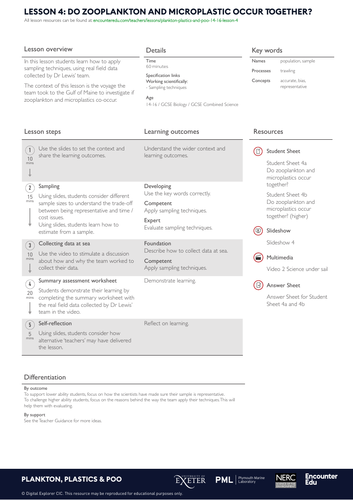





This Key Stage 4 (KS4) science lesson supports students to develop the ‘sampling techniques’ component of working scientifically for GCSE. It is based on current research being conducted by Exeter University and Plymouth Marine Laboratory.
Students work scientifically to discover if zooplankton and microplastic occur together.
In this lesson students learn how to apply sampling techniques, using real field data collected by Dr Lewis’ team. The context of this lesson is the voyage the team took to the Gulf of Maine to investigate if zooplankton and microplastics co-occur.
This full lesson includes:
Lesson Overview & Teacher Guidance
Slideshow 4 Do zooplankton and microplastics occur together?
Student Sheet 4a Do zooplankton and microplastics occur together?
Student Sheet 4b Do zooplankton and microplastics occur together? (higher)
Answer Sheet for Student Sheet 4a & 4b
This is Lesson 4 of 7 in the Plankton, Plastics and Poo unit of work, which is based on current research being conducted at the University of Exeter and Plymouth Marine Laboratory. The unit consists of enquiry-based lessons which support students to work scientifically by simulating the researchers’ investigations, and encourages students to the use their findings to have a wider impact.
The resource uses innovative methods to bring cutting edge science to the classroom, including:
- Using real field and laboratory data.
- Practical investigations that replicate the work of the scientists.
- Using social media to connect with the scientists.
- The opportunity to connect with scientists through Skype in the classroom events.
All lessons and resources are available from Encounter Edu’s TES profile.
Something went wrong, please try again later.
We are pleased to let you know that your resource Field investigation - Sampling techniques KS4 Science, has been hand-picked by the Tes resources content team to be featured in https://www.tes.com/teaching-resources/blog/cross-disciplinary-projects-science in June 2025 on https://www.tes.com/teaching-resources/blog. Congratulations on your resource being chosen and thank you for your ongoing contributions to the Tes Resources marketplace.
Great resource. The information rotation tasks are great if you are lacking a textbook.
Thanks for sharing. I will try this with my KS4.
Report this resourceto let us know if it violates our terms and conditions.
Our customer service team will review your report and will be in touch.